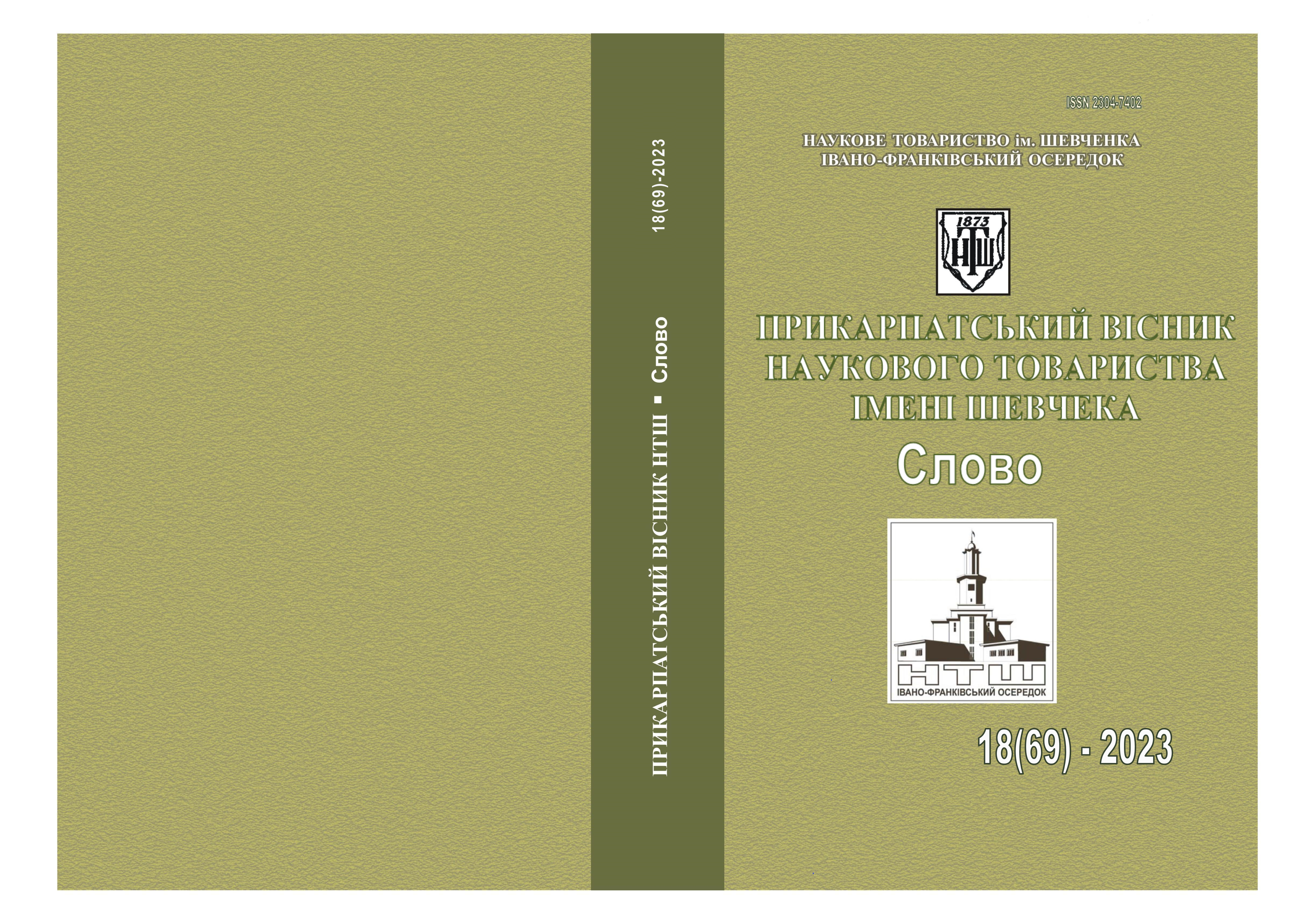PARTICLES AS A MEANS OF EXPLICATING THE SEMANTIC AND PRAGMATIC MEANING OF EXCLUSIVITY IN THE LITERARY TEXT OF MARIA TKACHIVSKA
DOI:
https://doi.org/10.31471/2304-7402-2023-18(69)-72-81Keywords:
particle; semantic and pragmatic meaning; discursive word; pragmatics of exclusivity, literary text.Abstract
The article presents the results of the analysis of semantic and pragmatic characteristics of particles that realize the general communicative meaning of exclusivity. The material of the study is the fictional text of the novels by the contemporary Ukrainian writer Maria Tkachivska «Hold on to the Air» and «Me and My Don Juan», with the main focus on the discourse-centered potential of the particle «even» (navitˊ).
The relevance of the problem is due to the need to clarify all the semantic, pragmatic and syntactic features of the particles «even» (navitˊ), «only» (lyshe), «only» (tilˊky), «as much as» (azh) etc., which are quite frequent in modern literary texts and help the speaker to highlight a particular component of the statement in accordance with the communicative purpose.
It has been found that one of the most frequently used particles in the analyzed literary text, which realizes the function of distinguishing something into a class, revealing the maximum or ultimate limit of something that is usually opposed to a certain norm, is the particle «even» (navitˊ). The main communicative meaning is often accompanied by various axiological components. The use of this particle indicates the unexpectedness or surprise of the course of events for the speaker. This is due to the inconsistency of what is covered by the particle «even» (navitˊ) with the speaker's acceptable norms, habits, stereotypes etc. At the same time, the analyzed particle can be used in a sentence as a means of creating a comic effect. The scope of the lexical particle «even» (navitˊ) includes subjects, objects, predicates, temporal, local and other distributors.
The main communicative meanings of the particles «only» (lyshe), «only» (tilˊky), and «as much as» (azh) are traced. By singling out something exceptional among the potential components of a certain group of objects, features or states, the particle «only» (lyshe) states exclusivity, while the lexeme «even» (navitˊ) interprets it. The general semantic and pragmatic meaning of the exclusivity of the particle «only» (tilˊky) is the speaker's allocation of a certain component in the message to a minimum or maximum class, which is opposed to other classes. Such emphasis is also associated with the author's commentary. The particle «as much as» (azh), expressing the semantics of exclusivity, at the same time explicates pragmatic shades of surprise, unexpectedness, and boundary. All particles, expressing separate facets of communicative meaning, can enter into synonymous relations.
References
Бацевич Ф. Частки української мови як дискурсивні слова : монографія. Львів : ПАІС, 2014. 288 с.
Джочка І. Семантико-прагматичні смисли стверджувальних часток (на матеріалі драматичного тексту Лесі Українки) // Волинь філологічна: текст і контекст. Універсум Лесі Українки. Луцьк : Східноєвроп. нац. ун-т ім. Лесі Українки, 2016. Вип. 22. С. 539–551.
Джочка І. Частки як виразники констатувальної модальності в романі В. Шкляра «Чорний ворон. Залишинець» // Актуальні проблеми синтаксису: сучасний стан і перспективи дослідження: матеріали Міжнародної наукової конференції, присвяченої 110-річчю від дня народження професора Іларіона Слинька (Чернівці, 16-17 червня 2022 р.) / за ред. С.Т. Шабат-Савки. Чернівці: Чернівец. нац. ун-т ім. Ю. Федьковича, 2022. С. 98–99.
Джочка І. Частки в ідіостилі Василя Стефаника: семантико-прагматичний аспект // Прикарпатський вісник Наукового товариства імені Шевченка. Слово. 2022. № 16 (63). С. 382–390.
Іваницька Н. Ускладнення структури номінацій денотатів частками (на матеріалі прози Михайла Стельмаха) // Михайло Стельмах у новітніх парадигмах наукового знання : збірник наукових праць. Вінниця : Нілан-ЛТД, 2017. С. 126–132
Канкаш Г. Д. Частки лише, навіть, тільки як ілокутивні індикатори сили висловлення // Лінгвістичні дослідження : зб. наук. праць ХНПУ ім. Г. С. Сковороди. 2016. Вип. 43. C. 28–33.
Кульматицька М. Частка як елемент ідіостилю Оксани Забужко // Науковий вісник Міжнародного гуманітарного унів. Серія : Філологія. 2015. № 8. Т. 1. С. 34–36.
Педченко С. Модально-експресивний потенціал видільних та вказівних партикулятивів // Філологічні науки. 2009. Вип 1. С. 122–129.
Педченко С. О. Акцентно-релятивна природа обмежувально-видільних часток // Науковий часопис Національного педагогічного університету ім. М. П. Драгоманова. Серія 10 : Проблеми граматики і лексикології української мови : зб. наук. праць. Київ : Видавництво НПУ імені М. П. Драгоманова, 2011. Вип. 8. С. 54–60.
Словник української мови online. Томи 1-13 (А-ПОКІ́РНО). URL : https://sum20ua.com/Entry/index?wordid=53586&page=1707
Ткачівська М. Тримайся за повітря : роман. Харків : «Клуб сімейного дозвілля», 2019. 272 с.
Ткачівська М. Я і мій Дон Жуан. Роман. Київ : Український пріоритет, 2017. 224 с.
Фролова І. Є., Омецинська О. В. Специфіка художнього дискурсу та його аспектів // Вісник Харківського національного університету імені В. Н. Каразіна. Серія : Іноземна філологія. Методика викладання іноземних мов. 2018. Вип. 87. С. 52–61.
Чолкан В. Частки як ускладнюючий елемент структури простого дієслівного присудка у мові творів Івана Франка // Семантика мови і тексту: Матеріали IX Міжнародної конференції. Івано-Франківськ: ВДВ ЦІТ, 2006. С. 204-206.
Wierzbicka A. Particles and Linguistic Relativity // International Revue of Slavic Linguistics. 1976. Vol. 1. № 2 / 3. Р. 327-367.

